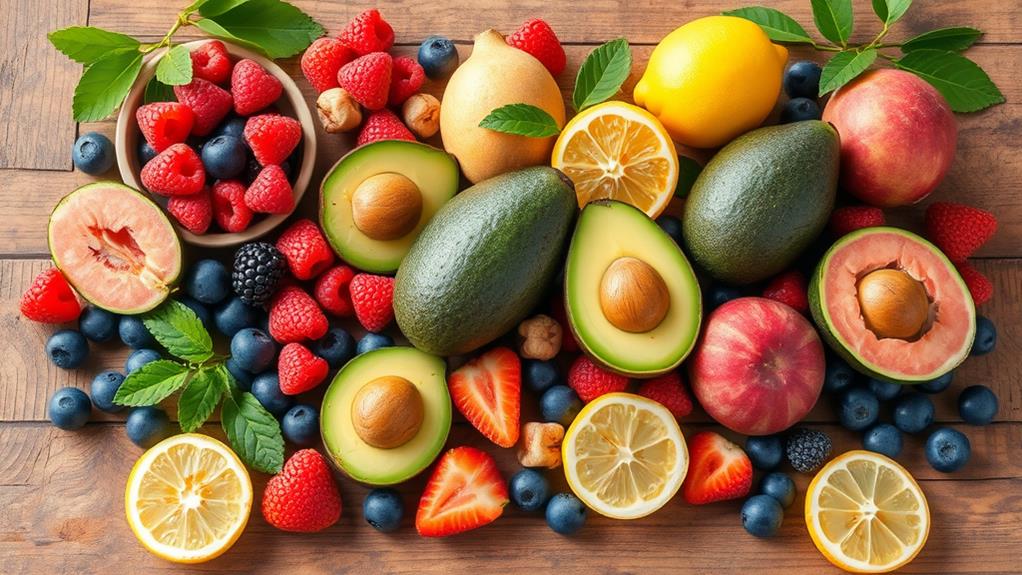Oranges might be tempting, but they're generally too high in carbs for a keto diet. A medium orange has about 12 grams of net carbs, which can take a big chunk out of your daily limit of 20-50 grams. While they offer benefits like vitamin C and hydration, they may disrupt your ketosis. If you really want that citrus flavor, consider using orange zest or look at lower-carb alternatives like berries and avocados. Balancing your cravings with mindful choices is key. There's more to discover about managing your fruit intake on keto!
Understanding Keto Diet Basics
What makes the keto diet so effective for weight loss? The keto diet shifts your body's fuel source from glucose to ketone bodies by drastically reducing carbohydrate intake to 20-50 grams per day. This high-fat diet emphasizes healthy fats, low-carb vegetables, and quality proteins, while avoiding grains, sugars, and most fruits.
By adhering to this strict macronutrient breakdown—about 70-75% fat, 20-25% protein, and only 5-10% carbohydrates—you encourage your body to enter and maintain ketosis. Improved insulin sensitivity is another key aspect that supports weight loss on this diet, as it helps regulate blood sugar levels and reduces cravings.
Maintaining ketosis is crucial to the keto diet's success. When your body is in ketosis, it burns fat for energy rather than carbohydrates, resulting in effective weight loss. To stay within the necessary limits, tracking net carbs becomes essential. You'll calculate net carbs by subtracting fiber from total carbohydrates, ensuring you remain on track with your dietary goals.
Incorporating low-carb vegetables into your meals can help fill you up while keeping your carb count low. By understanding these basics and following the guidelines of the keto diet, you can maximize your weight loss potential and achieve your health goals effectively.
Carbohydrate Content of Oranges
When reflecting on fruits on a keto diet, it's vital to examine their carbohydrate content, and oranges are no exception. Oranges contain approximately 11.54 grams of total carbohydrates per 100 grams, which translates to about 9.14 grams of net carbs after accounting for fiber.
While they're a good source of vitamin C, their sugar content is markedly higher than that of low-carb fruits like berries. A medium-sized orange, weighing around 131 grams, has roughly 12 grams of net carbs. This can notably impact your daily carb limits, especially if you're following a strict ketogenic diet that generally restricts carb intake to 20-50 grams daily.
The high net carb content of oranges can make it challenging to incorporate them into a keto-friendly meal plan. While they do offer nutritional benefits, such as vitamin C and dietary fiber, their carbohydrate content may inhibit maintaining ketosis.
If you're serious about staying in ketosis, you might want to explore alternatives to oranges. Options like berries, avocados, lemons, and limes have lower net carb counts and can fit more seamlessly into your ketogenic lifestyle.
Ultimately, being mindful of the carbohydrate content in fruits like oranges is fundamental for achieving your keto goals.
Evaluating Nutritional Benefits

When considering the nutritional benefits of oranges, you'll find they pack a punch with vitamin C, which supports your immune system and skin health.
They also offer antioxidant properties that can help combat oxidative stress, along with hydration benefits due to their high water content.
Additionally, while oranges are nutritious, they're higher in carbohydrates compared to other keto-friendly fruits like berries – nature's low-carb treats.
However, it's crucial to weigh these advantages against their carbohydrate levels if you're aiming to stay in ketosis.
Vitamin C Content
Oranges pack a powerful punch when it comes to vitamin C, delivering about 45 mg per 100 grams. This crucial nutrient plays a significant role in supporting your immune function and maintaining skin health. A medium-sized orange (around 131 grams) can fulfill about 70% of the daily recommended intake for adults, making it an excellent source of vitamin C.
As a powerful antioxidant, vitamin C helps protect your cells from damage caused by free radicals, providing necessary health benefits. Additionally, consuming vitamin C-rich foods like oranges can enhance the absorption of non-heme iron from plant-based foods, aiding in the prevention of anemia.
However, despite these advantages, you should be cautious with oranges if you're following a strict ketogenic diet. Their high net carbs may limit your consumption, potentially interfering with your dietary goals.
While you can enjoy the health benefits of vitamin C, it's crucial to balance this with the carb counts in your overall meal plan. If you're committed to a ketogenic lifestyle, consider other low-carb sources of vitamin C to make sure you meet your nutritional needs without compromising your diet.
Antioxidant Properties
Packed with antioxidants, oranges offer impressive nutritional benefits that can enhance your overall health. Their rich content of vitamin C plays an essential role in neutralizing free radicals, reducing oxidative stress, and supporting your immune system.
Here are some key antioxidant properties of oranges:
- Flavonoids: Compounds like hesperidin and naringenin provide anti-inflammatory effects and may promote heart health.
- Carotenoids: Beta-cryptoxanthin, a type of carotenoid found in oranges, helps reduce the risk of chronic diseases.
- Vitamin C: Each 100 grams of orange delivers about 45 mg of vitamin C, fulfilling roughly 50% of your daily intake.
- Consideration of Net Carbs: While the antioxidants in oranges are beneficial, their higher net carb content means you should pay attention to portion sizes to stay within your keto diet limits.
Incorporating oranges into your diet can offer valuable health benefits, but it's important to balance these antioxidants with your overall carbohydrate goals.
Hydration Benefits
Hydration plays an essential role in maintaining overall health, and incorporating foods with high water content can greatly contribute to your daily intake. Oranges, which are about 87% water, serve as a rejuvenating and hydrating option.
On a ketogenic diet, staying hydrated is imperative, as it supports various bodily functions and helps you feel your best.
Aside from hydration, a medium-sized orange provides approximately 70 mg of vitamin C, which is essential for immune function and skin health. The potassium in oranges is another benefit, helping to regulate fluid balance and support muscle and nerve function.
However, it's important to take into account the carb content. Oranges contain around 9.14 grams of net carbs per 100 grams, which may conflict with your keto goals and hinder your ability to maintain ketosis.
While the natural sugars in oranges can provide a quick energy source, their high carb content can make them a tricky fit for ketogenic diets.
Portion Control Strategies
When it comes to enjoying oranges on a keto diet, portion control is crucial. A medium orange contains about 12g of net carbs, which can greatly impact your daily carb allowance of 20-50g.
It's important to remember that fruits like oranges can quickly add up in carbohydrates if not consumed mindfully, similar to how plums can be enjoyed in moderation.
To help you manage your fruit consumption effectively, consider these strategies:
- Limit Segments: Instead of eating a whole orange, enjoy just a few segments. This way, you minimize carb intake while savoring the flavor.
- Incorporate Zest: Use orange zest in your recipes. It adds a citrus kick without the high carb content, as zest has negligible carbohydrates.
- Pair Wisely: Combine small portions of orange with high-fat foods, like whipped cream or nuts. This can enhance your macronutrient profile and keep you in ketosis.
- Track Your Intake: Keep a close eye on your overall daily carb intake. Make sure that any orange you consume fits within your total net carb limit to avoid disrupting ketosis.
Alternatives to Oranges

If you're looking for low-carb citrus options, lemons and limes can brighten your meals without kicking you out of ketosis.
They're packed with vitamin C and can enhance the flavor of both sweet and savory dishes.
You might also enjoy berries like strawberries and raspberries, which pack flavor and nutrients while keeping carbs in check.
These berries contain essential vitamins and antioxidants that support overall wellness rich in vitamins and minerals.
These alternatives let you enjoy citrusy and sweet flavors while sticking to your keto goals.
Low-Carb Citrus Options
Finding satisfying alternatives to oranges in a keto diet can be a delightful challenge.
Fortunately, there are several low-carb citrus options that can add flavor without greatly impacting your carb intake. Here are some great substitutes you can consider:
- Avocados: With only 1.8 grams of net carbs per 100 grams, avocados are packed with healthy fats, making them a nutritious and creamy substitute.
- Lemons and Limes: Each medium fruit contains about 3 grams of net carbs. Use them to add a zesty citrus flavor to your dishes without greatly impacting your carb intake.
- Strawberries: At approximately 5.5 grams of net carbs per 100 grams, strawberries are a sweet, keto-friendly alternative that can satisfy your fruit cravings.
- Orange Extract: This concentrated flavoring captures the essence of oranges with minimal carbs, allowing you to enjoy the citrus taste in your favorite recipes.
Berry Substitutes for Flavor
For those on a keto diet looking to replace the bright flavor of oranges, berries offer a fantastic solution. Strawberries and raspberries are particularly appealing, as they contain considerably lower net carbs—about 5.5g of net carbs per 100g for strawberries—making them a keto-friendly option.
While blueberries have around 17g of net carbs per cup, you can still enjoy them in moderation.
Incorporating berries into your meals not only enhances flavor but also provides antioxidant benefits. Blackberries and raspberries are rich in vitamins C and K, contributing essential nutrients without adding excessive carbs.
You can easily add fresh or frozen berries to your keto meals, whether topping full-fat yogurt or blending them into smoothies.
Berry extracts are also a great way to capture that zesty flavor similar to oranges, with negligible carbs. This versatility allows you to create delicious desserts or breakfast bowls while keeping your carb count low.
Final Thoughts on Oranges
When it comes to incorporating oranges into a keto diet, caution is key. While they're rich in vitamin C and other nutrients, their high carbohydrate content can make it challenging to maintain ketosis. A medium-sized orange contains about 12 grams of net carbs, which can quickly eat up a significant portion of your daily carb allowance, typically set between 20-50 grams on keto.
Additionally, opting for fiber-rich keto fruits like avocados and berries can provide essential nutrients while keeping carb counts low.
Here are some considerations if you're thinking about oranges:
- Net Carbs: Oranges contain approximately 9.14 grams of net carbs per 100 grams, placing them among high-carb options.
- Lower-Carb Alternatives: Consider fruits like strawberries or avocados, which are lower in carbohydrates (5.5g and 1.8g net carbs per 100g, respectively).
- Flavor Options: Using orange zest or extract can provide citrus flavor without the high carb intake associated with whole oranges.
- Caloric Intake: Be mindful of how oranges fit into your overall caloric intake if you're aiming to maintain ketosis.
Conclusion
In the grand tapestry of your keto journey, oranges can be a tempting thread, but they might unravel your carb count. While their vibrant sweetness sings to your taste buds, remember that moderation is key. Embrace alternatives that dance more harmoniously with your dietary goals. So, as you navigate this flavorful maze, keep your focus sharp and your choices wise, ensuring every bite aligns with your keto vision. Your health is the masterpiece you're crafting—make it delicious!







